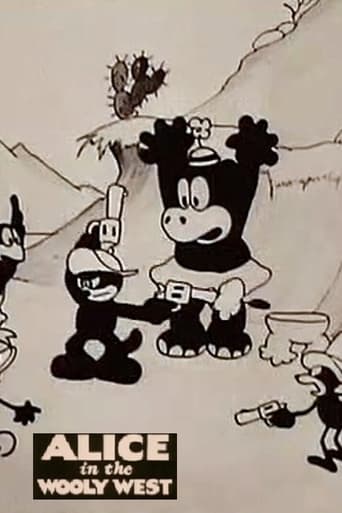wmorrow59
When I watch Walt Disney's 'Alice in Cartoonland' shorts I'm reminded of the early comedies Charlie Chaplin made at Keystone. In both cases you're looking at films that are lively and sometimes funny, but also primitive, violent, and crude in every sense of the word. It's unlikely that anyone who saw these films when they were new could have predicted that Disney and Chaplin would develop their artistry to the heights they each attained; moreover, it's likely that applying the very word "artistry" to what they were doing would have been considered questionable if not ridiculous at the time.Alice in the Wooly West, released in 1926, is a typical entry in Disney's 'Alice' series, neither the best nor the worst of the examples I've seen. It's fast and furious, and packs plenty of action into its six-and-a-half minute running time. The story, a harsh tale of frontier justice meted out in the Old West, could not be simpler. For cartoon buffs it looks like a template for the more polished adventures of Mickey, Minnie, and Pegleg Pete from the '30s, but executed with a bluntness that some may find startling—or, depending on your taste, kind of refreshing.The principle players are Julius the Cat (Felix in all but name), who is our hero; his nameless, goggle-eyed horse; the villain, a bear who serves as the Pegleg Pete prototype; and, of course, Alice. In this entry she's played by little Margie Gay, a Baby Peggy look-a-like with black bangs. No matter who plays her, however, Alice never has much to do in these films, probably because the rudimentary technique employed to blend her image with that of the animated characters did not allow for much in the way of interaction. Alice usually stands off to one side, out of the action, gesticulating, except when she's abducted by the villain, as happens here. In this episode, the villainous bear sets out to rob a stagecoach, backed by a team of desperado mice. (And how ironic that in this early Walt Disney cartoon, mice are the bad guys!) When the coach's trembling passengers step out, hands in the air, we see that they are mostly cartoon animals, but live-action Alice is among them. Then Julius shows up, guns blazing, and several of the mice are shot dead on the spot, a remarkably macabre scene. The villainous bear realizes the jig is up, grabs Alice, and heads for the hills. Julius follows, confronts the bad guy, and dukes it out with him while Alice stands by anxiously awaiting the outcome. I guess it goes without saying that justice eventually triumphs.For viewers accustomed to Disney's prime output the animation here will look primitive, but once you've seen other cartoons of the era made by other, lesser talents, the 'Alice' series comes off quite well in comparison. Disney's amazingly proficient animator Ub Iwerks cranked out reams of drawings for these shorts almost single-handed, and to Iwerks belongs much of the credit for the smooth action and clear, easily readable design. The gags are pretty simple, but serviceable. For example, during the stagecoach chase, when the pursuing mice shoot the coach's wheels off, it sprouts legs and runs. Later, as Julius chases the bad guy, firing his pistol wildly, he and his horse come to a pond. Instead of stopping, the horse dives in and swims across while Julius continues to sail overhead, still firing. Moments later the horse emerges from the water, and Julius lands on him neatly. They continue to charge forward as if nothing happened. Simple gags, sure, but still amusing.They may not be the best cartoons ever made, but I tend to seek out Disney's 'Alice' shorts and usually enjoy them, just as I seek out Chaplin's Keystones. It's fascinating to see where these guys started, and marvel at how far they went.
